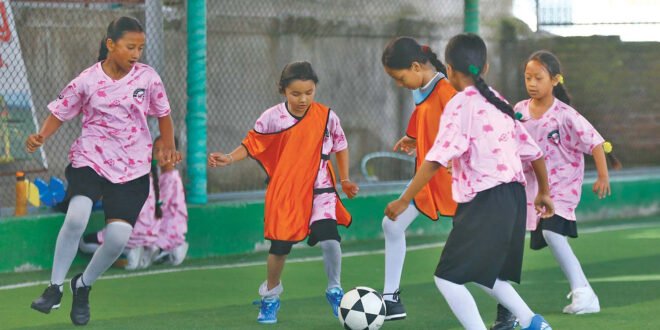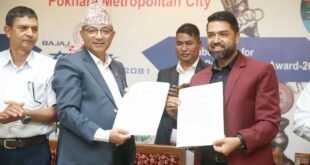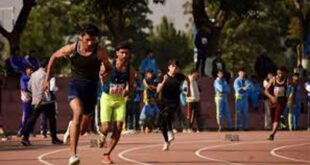A Grassroots Movement for Women’s Empowerment Through Sport
In 2014, a group of women in Nepal who shared a passion for futsal decided to organize an all-women’s tournament. They invited friends to act as referees and extra players, creating a space where they could enjoy the game together. This modest initiative was led by Arpana Pradhan, a member of the organizing team, who emphasized that the goal was to show how sports could positively impact their lives. “We wanted this impact to reach other girls and women,” she explained.
The event took an unexpected turn when national football team players showed up to compete. This moment made the organizers realize that women in Nepal, whether elite athletes or beginners, needed more opportunities to participate in sports. This realization led to the creation of the WE United Project, a movement dedicated to providing women with spaces to play, connect, and grow through sport.
Since its inception, the project has focused on not only offering opportunities for girls and women to play but also training them as coaches. From 2018 onwards, the project’s coaching program has trained 38 young women from five districts across Nepal. Currently, four coaches are based in Kathmandu, running the weekly all-girls football academy. Additionally, two coaches are working in Salyan, in western Nepal, and Udayapur, in the east.
What began as a small gathering of women playing on Saturdays has now evolved into a grassroots movement that instills valuable life lessons and confidence in girls through athletics. Arpana Pradhan, now the project’s executive director, is a living example of the benefits of sports in everyday life. “Sport has taught me resilience,” she said. “It helps us work under pressure and handle setbacks. It has helped me believe in myself.”
Arpana grew up playing sports at her school in Kathmandu and often found herself as the only girl participating. “From when I was a child, I thought, ‘If the boys are playing, why not us?'” she recalled.
Similarly, Silika Shakya, now the project’s programme director, had a different experience growing up. Although she loved sports, her father, who was the president of a national football club, did not support her playing the game. Despite this, Silika would sneak out with her brothers to play cricket in the neighborhood courtyards in Patan.
When she studied in the United States, she was surprised to see female athletes receiving opportunities to pursue their dreams. “I was like, ‘What?’ Girls can play sports?” she said. This experience transformed her perspective, leading her to join a tennis physical education class and eventually become deeply involved in sports.
Returning to Nepal, Silika sought every opportunity to engage in sports and joined WE United’s futsal games. “It was like, ‘This is what I’m meant for,'” she said. She later participated in the project’s first coaches’ training programme and has been the full-time programme director since 2019. Her involvement with WE United has significantly boosted her confidence. “A few years ago, I never would’ve spoken like this,” she said. “But once I became a coach, my voice got louder—more confident.”
The Power of Coaching and Leadership
C-level certified coach Razeta Shakya has been playing futsal with WE United for over a decade. Her journey began by coaching the group’s training programme, which transformed her life. “Coaching gave me a new kind of confidence,” she said. “Through football, I found my voice, my purpose, and my strength.”
Razeta hopes that her work will help the younger generation avoid some of the challenges she faced. “When I first started playing, I didn’t have access to quality training or proper opportunities, especially as a girl,” she explained. “Female coaches were almost unheard of, and we had to fight for even the most basic support.”
To provide more opportunities for women, WE United launched the Mahila Premier League, the first all-women’s futsal league in Nepal, in 2017. This month-long league has run four times, and Silika and Arpana hope to secure funding to sponsor it again soon.
Even if young women do not go on to become professional athletes, WE United believes that the skills learned through sports can benefit them in other areas of life. Teamwork, discipline, and resilience are just a few of the qualities that can be developed through sports.
In 2022, the project conducted a survey among 158 women in Nepal with a background in sports, finding that most believed participation in sports had helped them achieve career success. Kaka Prerana Malla, an operations manager at an Education & Migration Agency, shared how sports taught her leadership skills, teamwork, and discipline.
Despite these positive outcomes, barriers remain. Survey respondents cited a lack of spaces to play, family pressure, and social stigma as major challenges for women who want to participate in sports. That’s why the project focuses on creating safe, consistent opportunities for young girls, especially those without access to formal training.
Shaping the Future Through Sports
For the past year, Razeta has been running a weekly futsal training session for girls aged 6 to 12 from the Asha Vidhyashram School in Balaju, Kathmandu. Every Friday, before school, the girls train with drills and play in scrimmages under her guidance. They also train interested girls aged 6 to 14 every Saturday from 10 am to 12 pm at the Mandikatar-based Kaasthamandap Futsal Ground.
Initially, the girls were hesitant, but their enthusiasm has grown over time. “The first time they came to play, they didn’t speak a word,” Arpana shared. However, their aspirations have changed. “Previously, when asked what they wanted to become, they would say ‘nurse’ or ‘teacher’-things that are expected of women in Nepal,” Arpana said. “Now, they say ‘player’ or ‘coach like Razeta,’ which is so refreshing to hear.”
Kemuna Magar, one of the roughly 20 players who attend the weekly practices, found a love for sports through the training. “At first I was scared of playing football, but after I met everyone I started loving it,” Magar said. “After every pass I made with my friends, it became easier.”
Silika has not only impacted the lives of young girls through sports but has also changed the perspectives of her own family members. Her seven-year-old son, having observed her work, sees women as capable athletes. “My son, when I say ‘player,’ he thinks of both men and women,” Silika said proudly.
Her father, too, has changed his view on women in sports. “Now he fully supports me, and he is so proud of me,” Silika shared. Recently, he even asked her for help in forming a women’s team for his club.
Through futsal, coaching, and safe spaces, WE United is doing more than teaching girls how to play—it’s helping them rewrite the rules of who they can become. And at a time when Nepali women’s football is reshaping how the nation sees women in sports, WE United’s work is breaking down long-standing stereotypes—one kick, one goal, and one confident girl at a time.
 Info Malang Raya Its All About World News
Info Malang Raya Its All About World News



